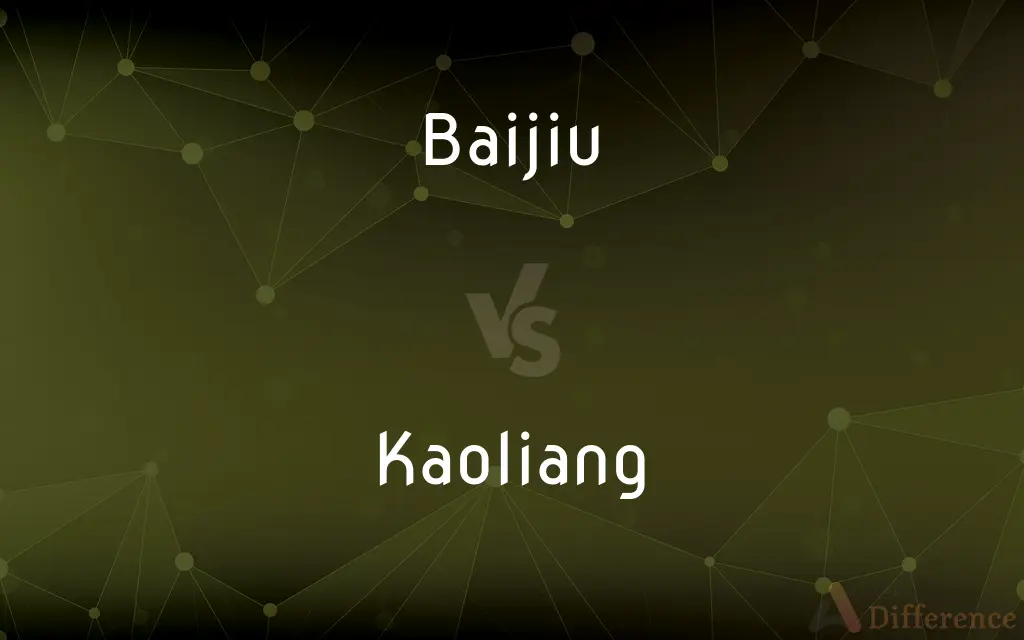Baijiu vs. Kaoliang — What's the Difference?
Edited by Tayyaba Rehman — By Urooj Arif — Updated on April 24, 2024
Baijiu is a Chinese distilled spirit known for its high alcohol content and variety of flavors, while Kaoliang, a type of Baijiu, specifically uses sorghum and is noted for its clarity and boldness.

Difference Between Baijiu and Kaoliang
Table of Contents
ADVERTISEMENT
Key Differences
Baijiu encompasses a broad category of Chinese spirits made from grains, with an alcohol content typically ranging from 40% to 60%. On the other hand, Kaoliang is a specific style of Baijiu, predominantly made from sorghum, and is known for its high purity and strength, often exceeding 50% alcohol by volume.
The flavor profile of Baijiu varies widely depending on its ingredients and fermentation process, with some being light and floral, and others rich and savory. Whereas Kaoliang is characterized by its sharp and robust flavor, making it distinct within the Baijiu family for its straightforwardness and minimal aftertaste.
Baijiu is often categorized into several types, such as strong aroma, light aroma, and rice aroma, each defined by unique production methods and regional traits. In contrast, Kaoliang is mainly produced in Taiwan and the Matsu Islands, maintaining a consistent profile focused on highlighting the natural flavors of sorghum.
In terms of consumption, Baijiu is traditionally enjoyed during meals and special occasions across China, served in small cups and often warmed. On the other hand, Kaoliang is especially popular in Taiwan and among overseas Chinese communities, frequently consumed neat to appreciate its clean, crisp taste.
Regarding cultural significance, Baijiu plays a central role in Chinese social rituals, symbolizing hospitality and good fortune. Kaoliang, while also culturally significant, particularly in Taiwan, is often associated with the island's military history and local festivities.
ADVERTISEMENT
Comparison Chart
Main Ingredient
Various grains (sorghum, rice, etc.)
Sorghum exclusively
Alcohol Content
40%-60%
Usually above 50%
Flavor Profile
Varies (light, floral to rich, savory)
Sharp, robust
Popular Regions
Mainland China
Taiwan, Matsu Islands
Cultural Significance
Symbol of hospitality and celebration in China
Tied to Taiwanese military history and local festivals
Compare with Definitions
Baijiu
Integral to Chinese social and cultural rituals.
Baijiu is poured at family gatherings to honor ancestors.
Kaoliang
A clear, strong type of Baijiu made primarily from sorghum.
Kaoliang is particularly favored in Taiwanese celebrations.
Baijiu
Produced in various styles based on aroma.
The light aroma Baijiu is preferred for its subtle and smooth taste.
Kaoliang
Consumed neat to appreciate its purity.
In Taiwan, Kaoliang is often sipped slowly to savor its clean finish.
Baijiu
A traditional Chinese distilled spirit made from grains.
Baijiu is often consumed at Chinese weddings and business meetings.
Kaoliang
Noted for its bold and fiery flavor.
The sharp taste of Kaoliang can be a challenge for the uninitiated.
Baijiu
Known for its high alcohol content and complex flavor profiles.
The strong aroma Baijiu can have notes of fruits and spices.
Kaoliang
Typically has a higher alcohol content than other Baijius.
The Kaoliang bottle on the table was labeled 58% alcohol by volume.
Baijiu
Served typically in small ceramic cups.
During the banquet, guests toasted with small cups of Baijiu.
Kaoliang
Has a strong cultural presence in Taiwan.
Kaoliang has been celebrated in Taiwanese literature and films.
Baijiu
Baijiu (Chinese: 白酒; pinyin: báijiǔ; lit. 'white (clear) liquor'), also known as shaojiu (烧酒/燒酒), is a colourless liquor typically coming in between 35% and 60% alcohol by volume (ABV).
Kaoliang
A sorghum-based variety of baijiu.
Baijiu
A clear Chinese distilled alcoholic beverage, generally distilled from sorghum and about 40-60% alcohol by volume.
Kaoliang
Any of various Chinese varieties of sorghum.
Kaoliang
Sorghums of China and Manchuria having small white or brown grains (used for food) and dry pithy stalks (used for fodder, fuel and thatching)
Common Curiosities
What distinguishes Kaoliang from other types of Baijiu?
Kaoliang is distinguished by its exclusive use of sorghum, higher alcohol content, and sharp, clean flavor profile.
Can Baijiu be made from rice?
Yes, one of the categories of Baijiu, known as rice aroma Baijiu, is made exclusively from rice.
What does Kaoliang taste like?
Kaoliang is noted for its fiery and straightforward flavor, often with a crisp finish.
Why is Kaoliang popular in Taiwan?
Kaoliang's popularity in Taiwan is due to its cultural significance and historical ties to the island's military communities.
What is Baijiu?
Baijiu is a Chinese distilled spirit made from various grains and noted for its wide range of flavors and high alcohol content.
What is Kaoliang?
Kaoliang is a type of Baijiu primarily made from sorghum, known for its clarity and robust flavor.
How is Baijiu traditionally consumed?
Baijiu is typically served warm in small ceramic cups during meals and special occasions.
How is Kaoliang integrated into Taiwanese festivals?
In Taiwan, Kaoliang is often a central feature in local festivals, enjoyed among friends and family during celebrations.
Is Baijiu only produced in China?
While Baijiu is predominantly produced in China, it is also made in several other countries with significant Chinese populations.
How does the alcohol content in Baijiu affect its flavor?
Higher alcohol content in Baijiu often intensifies the complexity of its flavors, making it more potent and richer.
What role does Baijiu play in Chinese culture?
Baijiu is deeply ingrained in Chinese culture, symbolizing hospitality, celebration, and communal bonding.
What is the best way to experience Kaoliang for the first time?
For those new to Kaoliang, it is recommended to sip it slowly to acclimate to its strong and distinct flavor profile.
What are the different types of Baijiu aromas?
The main types of Baijiu aromas include strong aroma, light aroma, and rice aroma, each with distinctive characteristics and production methods.
Is Kaoliang served warm or cold?
Kaoliang is usually served neat and at room temperature to better appreciate its pure and robust flavor.
Can Baijiu be used in cocktails?
Yes, Baijiu can be used in cocktails, offering a unique flavor base that complements various mixers.
Share Your Discovery

Previous Comparison
Polling vs. Interrupt
Next Comparison
Contemplation vs. ReflectionAuthor Spotlight
Written by
Urooj ArifUrooj is a skilled content writer at Ask Difference, known for her exceptional ability to simplify complex topics into engaging and informative content. With a passion for research and a flair for clear, concise writing, she consistently delivers articles that resonate with our diverse audience.
Edited by
Tayyaba RehmanTayyaba Rehman is a distinguished writer, currently serving as a primary contributor to askdifference.com. As a researcher in semantics and etymology, Tayyaba's passion for the complexity of languages and their distinctions has found a perfect home on the platform. Tayyaba delves into the intricacies of language, distinguishing between commonly confused words and phrases, thereby providing clarity for readers worldwide.














































